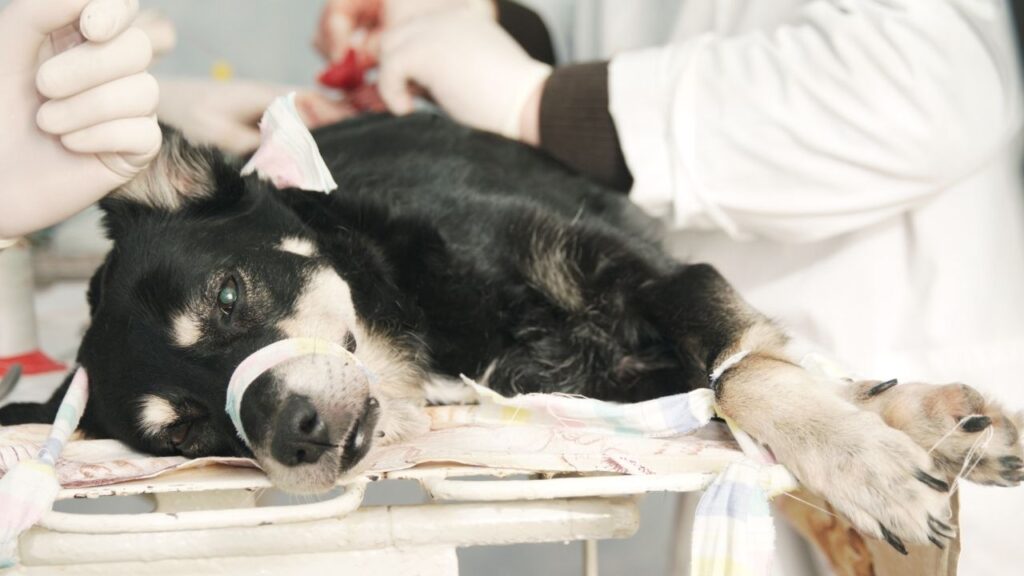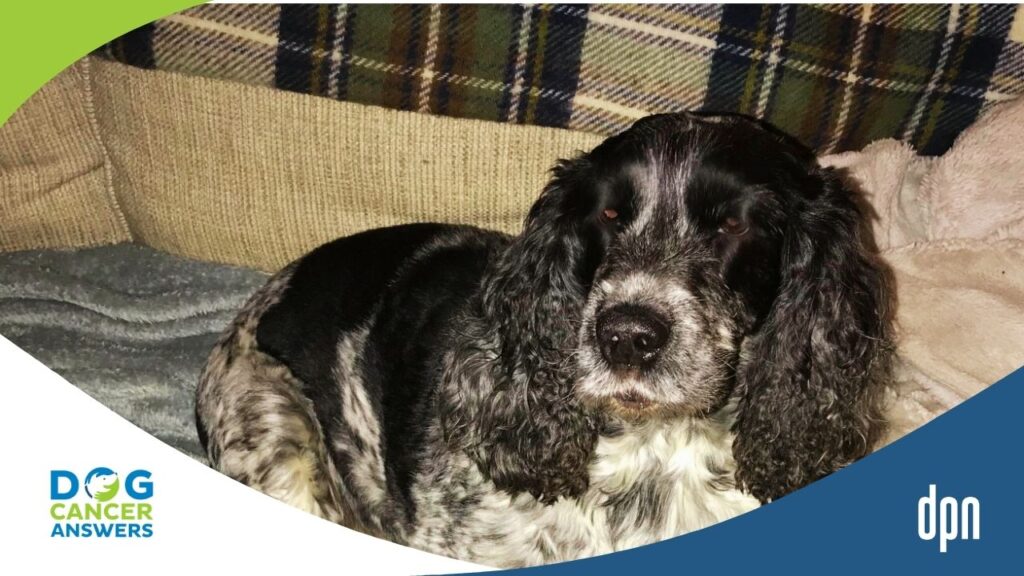[00:00:00] >> Dr. Megan Duffy: ;It definitely has value and it has use for bladder tumors, but there’s probably some other detail that is making that come to the forefront as a recommendation.
[00:00:11] >> Announcer: Welcome to Dog Cancer Answers, where we help you [00:00:15] help your dog with cancer.
[00:00:17] >> Molly Jacobson: Hello, hello, I’m Molly Jacobson. I’m editor-in-chief at DogCancer.com, where we believe in better information so you have no regrets tomorrow. On today’s special episode, we [00:00:30] hear from a listener about her dog with transitional cell carcinoma, more commonly called TCC, and the use of radiation.
[00:00:39] James Jacobson, founder of Dog Podcast Network is our host for today. And [00:00:45] Dr. Megan Duffy, a veterinary oncologist who’s compassionate and wise words of advice are always welcome here on Dog Cancer Answers, is handling the medical advice portion of the show.
[00:00:58] So today’s question comes from [00:01:00] Heather in New Jersey, whose dog has transitional cell carcinoma and her veterinary oncologist is recommending radiation, but her friends have never heard of it.
[00:01:08] So we’re going to look at what Heather’s concerns are, and we’re also going to get some well earned [00:01:15] advice from Dr. Megan Duffy about how to approach conversations with veterinarians. So, whether your dog has transitional cell carcinoma or not, I definitely recommend you stick around because Dr. Megan Duffy’s advice is spot [00:01:30] on.
[00:01:30] Dr. Megan Duffy is one of the many veterinarians and veterinary oncologists, cancer researchers and science writers who contributes to our website, DogCancer.com to make sure that you’re getting the best advice you can [00:01:45] online that you can then take back to your veterinarian to see how it applies in your dog’s case.
[00:01:50] If you are thinking you have your own question about dog cancer you want to ask, go to DogCancer.com/ask and enter your question or share your [00:02:00] story. And now let’s get right to James Jacobson and Dr. Megan Duffy talking about transitional cell carcinoma and answering Heather’s question.
[00:02:10] >> James Jacobson: Dr. Megan Duffy, thank you so much for being with us today.
[00:02:13] >> Dr. Megan Duffy: Thank you. It’s always a pleasure. [00:02:15]
[00:02:15] >> James Jacobson: Today is a listener line question. We have lots of people who listen to the show and watch it on YouTube and of course members of our community at DogCancerSupport.com on Facebook. And it’s a question that we got [00:02:30] from Heather who is calling in from New Jersey. She has a question about using radiation with her dog with TCC. Let’s listen to the call.
[00:02:39] >> Heather: Hi, my name is Heather. I’m calling from New Jersey. I’m calling because [00:02:45] my dog was diagnosed with transitional cell carcinoma. We actually had the tumor, which was actually in her bladder, removed about a month ago and the vet encouraged us to go see an [00:03:00] oncologist, which we did. And she is recommending chemo and radiation.
[00:03:06] I was calling because I’ve spoken to a few people who have either gone through something similar with their dog [00:03:15] and they were surprised about the radiation. Their dog was just treated with chemo. So I was calling to see if radiation is definitely something that should be considered or if chemo is the main [00:03:30] method.
[00:03:30] So if somebody can let me know if this question could be addressed, that would be great. Thank you so much for your time.
[00:03:37] >> James Jacobson: Dr. Duffy, what do you have to say about that?
[00:03:40] >> Dr. Megan Duffy: So there are a couple of things to unpack in this question, and [00:03:45] usually when we’re dealing with bladder tumors, so many of them can’t be removed surgically or can’t be addressed with any other local control. And we think about surgery and radiation as our kind of local treatments that kind of by [00:04:00] default, we’re often stuck with chemo, you know, plus minus a non-steroid anti -nflammatory. And that’s kind of our mainstay of therapy because of that plumbing issue and the anatomy involved.
[00:04:10] So this situation is already better than the [00:04:15] average dog with bladder cancer, if there is such a thing, because, hey, we’ve already got that tumor out surgically. And so recommending radiation on top of it tells me that there may be something about that local situation that isn’t [00:04:30] completely gone with surgery. Maybe we didn’t get big margins. Maybe there was some other kind of abnormal looking tissue in the bladder or something residual that we’re worried about.
[00:04:42] So I would wonder, is there something [00:04:45] else locally in that little bladder that we are trying to address with radiation? And that’s why it’s a little bit of a different recommendation. And I think that’s definitely worth asking the oncologist about to say, hey, what are we doing with the radiation therapy right now?
[00:04:59] We’ve [00:05:00] done surgery. Is there something microscopic that we’re worried about? And then the chemotherapy recommendation, you know, certainly still makes sense. This is a disease that we know can grow back that sometimes microscopic bits of the bladder may be affected, [00:05:15] but we don’t know it yet. So we’re still trying to cover all of our bases.
[00:05:19] We don’t want this to spread. So I think it’s worth asking, what about my individual dog makes radiation a recommendation? Because it definitely has value and it has [00:05:30] use for bladder tumors, but there’s probably some other detail that is making that come to the forefront as a recommendation.
[00:05:38] >> James Jacobson: Okay, so from your experience when you’re dealing with TCC, surgery is the best [00:05:45] and then you normally do chemotherapy, and rarely, at least from your experience, would you use radiation unless there was something really unusual about the case?
[00:05:55] >> Dr. Megan Duffy: Often for me, radiation is when I have a tumor that [00:06:00] couldn’t be addressed with surgery at the beginning and either maybe we’re starting to run out of chemotherapy options or we’re getting toward that obstruction of either urethra or ureter. So something in the plumbing [00:06:15] where urine isn’t going where it’s supposed to go. Pressure is building up. Things are not good and we need to take down that inflammation in that tumor to sort of de-obstruct that spot.
[00:06:25] So for me, I’m usually using radiation either because chemo is not doing it anymore [00:06:30] or we’ve got something that needs to be de-obstructed in a hurry.
[00:06:33] >> James Jacobson: But the fact that she had surgery and presumably with good margins, then it probably wouldn’t be something that you would recommend in this case.
[00:06:41] >> Dr. Megan Duffy: That’s where I would wonder, is there some other detail to [00:06:45] this individual dog situation that would maybe change that recommendation?
[00:06:50] >> Molly Jacobson: Okay, let’s take a pause here to hear from our good sponsors, and then we will be right back to hear Dr. Duffy’s thoughts on how to have challenging conversations [00:07:00] with your veterinarian.
[00:07:01] We’ll be right back.
[00:07:06] >> James Jacobson: Well, how do you have that conversation with an oncologist? You know, how would you coach her to have this conversation with her doctor? [00:07:15]
[00:07:15] >> Dr. Megan Duffy: I think it may be something where, you know, if she can sit down with her oncologist and say, gosh, there’s a lot of moving parts in my dog’s treatment, can you walk me through each part of the therapy and kind of What we’re doing with it?
[00:07:29] What’s the [00:07:30] goal of radiation and what is radiation going to help with? And then what’s the goal of the chemo? What is the chemo going to help with? Because if it is sort of looking at additional local therapy and then systemic therapy or, actually, there was, you know, a [00:07:45] margin that was incomplete from your dog’s surgery and I’m trying to get that, then it kind of makes more sense.
[00:07:50] And sometimes it’s with those multimodal therapies that I know are great and they often can give us really good outcomes, it’s easy to get lost in. I’m not sure which [00:08:00] piece is doing which thing. And it may be just worth kind of walking through step-by-step what’s doing what here.
[00:08:06] >> James Jacobson: So, I’m just trying to guess more trying to get into the like the dynamics of how to talk to your vet, because I think, you know, as we’ve talked about on other episodes, there are only a [00:08:15] few hundred veterinary oncologists in North America and obviously you guys are very busy and you know what, you know, and when a client kind of checks, maybe they contact Dog Cancer Answers or they check on something [00:08:30] and say that doesn’t seem exactly right.
[00:08:32] What’s the most welcome, most appropriate way that you would suggest someone approach their doctor, you know, like the words, and also like what kind of pushback might they expect and what would happen if the oncologist [00:08:45] was pushing back?
[00:08:46] >> Dr. Megan Duffy: I would say based on, at least for me, how my clients kind of check in and say, Hey, let me make sure I’m understanding, or can we walk through all of the components of my dog’s treatment? This is fairly complicated. You know, [00:09:00] I, at least personally, don’t find that threatening. I feel like that’s more, that’s information gathering that’s helped me understand what’s happening. So I have that sort of empowered feeling to know exactly why this is going on. So, I mean, at least for me, I would never take that [00:09:15] offensively.
[00:09:15] I think it’s, It’s, I think it’s fun when people are this involved in their pet’s care. So for me, getting that as a call or an email or a, Hey, the next time we meet, can we just sit down and go over this so I can feel comfortable about all of the steps, you know, that might be some of the, the [00:09:30] verbiage or the context of hey, can we just talk through how all this is fitting together so I can feel comfortable?
[00:09:37] >> James Jacobson: Kind of a loaded question, but do you welcome clients who are, you know, as proactive as Heather is here in terms of [00:09:45] like going out and researching and checking assumptions and stuff like that? How do you personally receive that?
[00:09:52] >> Dr. Megan Duffy: Oh, absolutely. You know, in a way, I love it because it means I have, you know, clients and situations where they say, I’ve done this [00:10:00] reading and research. I’m really interested. I want to know I’m doing the best for my pet. Have you heard about this? Do you know about that? Tell me why this is being recommended over that.
[00:10:09] And it really opens up to a conversation about what is the best way to the [00:10:15] latest recommendation or what is the newest drug? Is this appropriate for your pet? Or, hey, this is something that I have personal experience with that maybe isn’t published, but how do you feel about X, Y, or Z? And we can really make a very personalized [00:10:30] recommendation that everybody feels that much better about because we’ve had that conversation.
[00:10:34] So I think it’s a lot of fun when we do that.
[00:10:37] >> James Jacobson: Well that is why we are so glad that you are part of our team at DogCancer.com. You, Dr. Duffy, and all the vets on our team, you know, share that [00:10:45] approach. And if you’re listening or watching this podcast, know that there’s a lot more information at DogCancer.com and, uh, great vets like Dr. Duffy, Dr. Duffy, thank you so much for being with us today.
[00:10:57] >> Dr. Megan Duffy: Thank you. It’s been a lot of fun.
[00:10:59] >> Molly Jacobson: [00:11:00] And thank you, listener, for being here. If you found this helpful, please like and subscribe to our podcast wherever you listen to podcasts. And don’t forget to go to DogCancer.com and submit your own question or share your own dog cancer story.
[00:11:14] [00:11:15] For all of us here at Dog Podcast Network, I’m Molly Jacobson, wishing you and your dog, a warm aloha.
[00:11:25] >> Announcer: Thank you for listening to Dog Cancer Answers. If you’d like to connect, please [00:11:30] visit our website at DogCancer.com or call our listener line at (808) 868-3200. And here’s a friendly reminder that you probably already know, this podcast is provided for informational and educational purposes only. [00:11:45] It’s not meant to take the place of the advice you receive from your dog’s veterinarian.
[00:11:49] Only veterinarians who examine your dog can give you veterinary advice or diagnose your dog’s medical condition. Your reliance on the information you hear on this podcast is solely at your own risk. If your dog has a [00:12:00] specific health problem, contact your veterinarian. Also, please keep in mind that veterinary information can change rapidly, therefore, some information may be out of date.
[00:12:09] Dog Cancer Answers is a presentation of Maui Media in association with Dog Podcast [00:12:15] Network.











